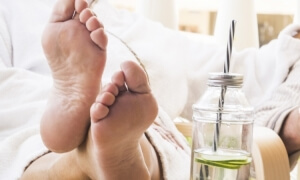
Your Feet Are Key to Senior Health and Mobility
By CarePatrol
You may not realize it, but foot health is a vital part of your overall ability to stay active and mobile in your later years. Your feet are the foundation of your lower extremities. If you have any serious form of foot disorder it can affect how you walk, your ability to perform, even affect mild forms of exercise, and possibly your ability to perform some normal activities of daily living.
Foot pain and functional impairment can cause gait changes which will work its way up the leg and cause ankle, knee, and even back and hip pain over time. Some foot ailments are hereditary but can be treated with proper care.
Unhealthy Feet May Indicated Other Health Issues
There are some chronic health issues that present symptomatic effects that can first show up in the feet. Diabetes, circulatory problems, and arthritis can all contribute to foot discomfort, pain, infection, and in severe cases, amputation. Tingling, numbness, cold feet, dry, or cracked skin can be the first signs of a more serious health problem. Your podiatrist or family doctor should be consulted if you experience any unusual changes, discomfort or discoloration in your feet.
Avoiding Foot Problems
You may not have to live with foot pain just because you are getting older. It is not inherently normal for feet to hurt. There are hundreds of foot ailments, many of which can be treated and cured, or at least relieved by a podiatrist.
There is an old saying “If you take care of your feet, your feet will take care of you”. Just like other parts of your body, your feet will naturally change through the process of aging. Shoe sizes change, cushioning tissue deteriorates, and the basic structure of the foot may change for various reasons. Certainly, women wearing high heels frequently and anyone experiencing significant weight gain may experience foot changes that become problematic over time.
Wearing comfortable shoes that fit correctly and provide adequate support can avoid some foot problems such as corns, arch pain, and bunions. Safety-toed shoes may be necessary for certain occupations to avoid foot injuries which may worsen over time.
Other common-sense solutions to promote foot health are: Bathe with warm water and soap and inspect feet daily. Consult your podiatrist if you notice any wounds, discoloration, cracking, or toenail issues. Trim toenails regularly or have them trimmed professionally to avoid in-grown nails.
Walking is a great way to keep feet strong and healthy. Try to walk regularly with comfortable shoes designed for that purpose. Never try to cut or cure corns and calluses yourself. Consult your podiatrist for treatment. Another old saying “an ounce of prevention is worth a pound of cure” may be appropriate regarding your feet.
Taking care of your feet will help you feel better and allow you to live a fuller, healthier life. By addressing foot issues early and taking preventive steps you can experience less chronic pain, infections, hospital visits and live independently longer.
